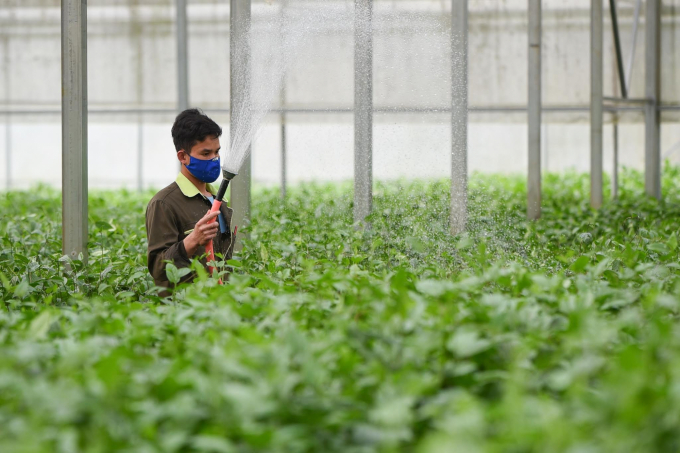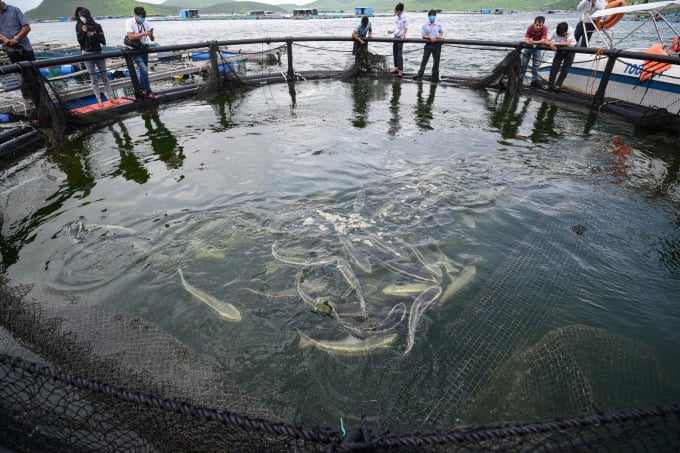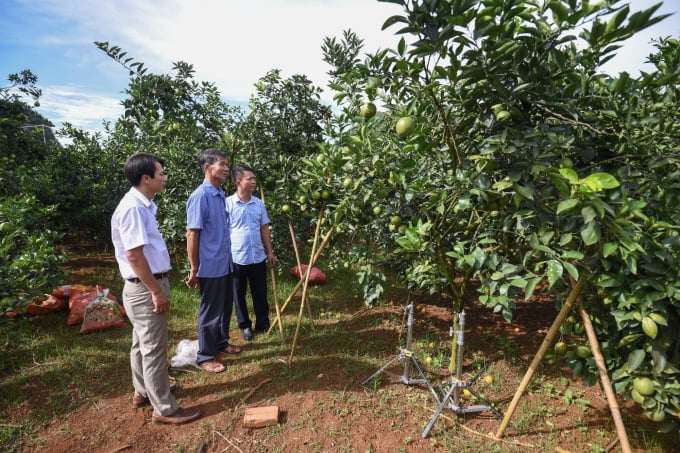June 19, 2025 | 09:41 GMT +7
June 19, 2025 | 09:41 GMT +7
Hotline: 0913.378.918
June 19, 2025 | 09:41 GMT +7
Hotline: 0913.378.918

Responsible agricultural production is an urgent requirement at the moment. Photo: Tung Dinh.
Today on November 30th the High Level Policy Dialogue (HLPD) “Transition to a Green and Low-Emissions Food System” chaired by Minister of Agriculture and Rural Development Le Minh Hoan will take place in Hanoi with the participation of World Bank leaders, domestic and foreign experts.
“New Vision in Agriculture” is an overarching initiative of the World Economic Forum, aimed at sustainable and responsible agricultural development. Vietnam is on the path to realizing this initiative in a chain of products including coffee, rice, tea, vegetables, seafood, pepper, livestock, and agrochemicals.
At recent forums and meetings Minister Le Minh Hoan always emphasized the orientation of developing “The 2030 strategy for sustainable agricultural and rural development - 2050 vision”.
“The strategy aims at restructuring the agriculture sector, developing rural economy in association with ‘new rural construction’. The strategy revolves around three pillars: ‘ecological agriculture’, ‘modern countryside’, and ‘smart farmers’.
“The agriculture sector also identifies the need to undergo the transition from ‘production mindset’ to ‘economic mindset’ towards ‘green values’ created from ‘green transition, green consumption, green economy," said Minister Le Minh Hoan.

Green aquaculture environment requires minimizing the use of chemicals and antibiotics. Photo: Tung Dinh.
Promotion of the integration of green values, biodiversity and cultural values will be the breakthrough that helps Vietnam become Asia's food innovation hub instead of just exporting raw products with low added value and high dependence on exhaustive exploitation of natural and social resources.
Deeply understanding the strategic direction of Vietnam’s agriculture sector, Mr. Alan Matthews, Professor Emeritus of European Agricultural Policy, Trinity College (Dublin, Ireland) shared that the strategy’s goals have many similarities with the EU’s "Farm to Fork" strategy, particularly the main goals until 2030.
The EU sets specific targets: Reduce 50% of the need and the risk of using chemical pesticides and 50% of the excess need to use toxic pesticides by 2030; Apply organic production on 25% of the agricultural area; Reduce nutrient loss by at least 50% while ensuring no loss of soil fertility (potentially reducing the need for fertilizer use by at least 20% by 2030); Reduce 50% of antibiotic sales.
According to Prof. Alan Matthews, the EU's strategies of "Farm to Fork" and “Decarbonising European agriculture” will reduce EU agricultural output and create export opportunities for third-partied countries. Even so it does not mean that entering the EU agricultural market has become easier as the requirement includes high sustainability standards. Exporting enterprises must demonstrate their ability and practical actions in complying with these standards.

Reducing pesticides and increasing the use of organic fertilizers will help agro-products output gradually approach the ‘green standards’. Photo: Tung Dinh.
Expert Jikun Huang from China Center for Agricultural Policy (CCAP) in Peking University gives out some pieces of advice to Vietnam during the transition to emissions-reduction agriculture through specific lessons in China.
The biggest turning point to China’s green agriculture started in 2017, represented by the following policies: Establishment Plan for Institutions and Incentive Systems “renovating systems and mechanisms to promote green agriculture development”; or in 2018 the Ministry of Agriculture and Rural Affairs of China (MARA) issued the “Technical Guidelines on Green Agricultural Development in the 2018 - 2030 period” and built an efficient, safe, emission-reducing, circular, intelligent and integrated technology system to develop green agriculture, and promoted scientific and technological innovations in service of green agriculture.
MARA together with six other ministries issued the “Green Development Plan for the Agriculture Sector” as a component of the 14th Five-Year Plan (2021-2025).
Vietnam's agriculture is not only in service of the 100 million Vietnamese people but also stands among the top 15 world leading agro-products export powerhouse, reaching markets of over 190 countries and territories.
Consumers now require higher quality, safer, more nutritious and more accessible agro-products. Vietnam's agricultural production and export must be greener, more humanitarian and more reliable. New markets require agricultural production to be responsible to consumers and, on a larger view, global environmental sustainability.
Over the past ten years, Vietnam is considered to have demonstrated significant commitments to promoting a more sustainable growth path and increasing efforts in climate adaptability and mitigation, reflected in a large number of strategies, plans, resolutions and revised documents. However, according to the assessment of the World Bank (WB), some of these are only at the experimental level or have not been fully integrated across sectors.
Mr. Steven Jaffee from the World Bank said that the great environmental impact of Vietnam's agricultural industry is due to many reasons, including the excessive and inefficient use of inputs (irrigation water, fertilizers, pesticides, antibiotics), poor management of waste or output, and degradation of natural ecosystems. All of these are currently negatively impacting agricultural growth, productivity and livelihoods.
Translated by Samuel Pham

(VAN) After 5 years of implementation, the CAI initiative has helped coffee growers change their farming practices, moving toward responsible agriculture that meets global export standards.

(VAN) The primary prerequisite for the comprehensive and robust integration of Vietnam's livestock sector into the global value chain is the establishment of a disease control system.

(VAN) The results of national programs are essential for establishing a contemporary livestock sector that is well-equipped to meet the demands of both domestic and international markets, with robust biosafety standards.

(VAN) The UNESCO Global Geopark revalidation of Non nuoc Cao Bang and the transition to a two-tier administrative model are presently undergoing a pivotal moment in Cao Bang, the northernmost province of Vietnam.
/2025/06/13/5330-2-004539_953.jpg)
(VAN) Changing policy mindset and removing investment barriers are urgent requirements to open up new development space for enterprises in the agricultural sector.

(VAN) The areas include the restoration of five million hectares of marine ecosystems.

(VAN) Dr. Le Van Nguyen, Director of the Institute of E-Commerce Management (ECM), emphasizes the potential for green development through the cultivation of fruit trees, particularly in provinces such as Son La.